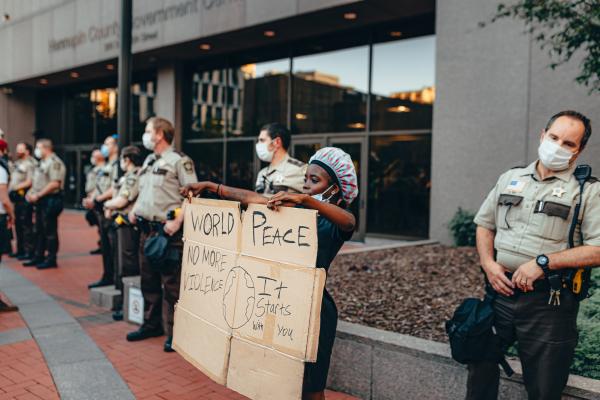
The term "2020" is often a reference to clear vision and clear perception. The year 2020 and the first days of 2021 have proven to be an exceptionally important and fraught one regarding civil-military relations, but its implications remain ambiguous. To help bring the events of 2020 -- and the attack on the Capitol of Jan. 6, 2021 -- in sharp focus, this session will focus on key developments and dilemmas, their implications, and what can or should be done in terms of norms and laws. Our expert panel will reflect on our civil-military system's response to the pandemic (including controversy and dismissals stemming from a COVID outbreak aboard a U.S. aircraft carrier), racism-related civil unrest (particularly the Lafayette Square incident of June 1, 2020, concern about politicization of the armed forces by the President, and pushback from top civilian and military defense officials to presidential interest in domestic deployment of active duty federal troops in U.S. cities pursuant to the Insurrection Act), and suggestions and worries that our armed forces could be forced into involvement in the 2020 election. We will also reflect on the Jan. 6, 2021 attack on the Capitol by supporters of the Commander in Chief, and nomination of another recently-retired military officer to be Secretary of Defense. This is a full but necessary agenda for any discussion of the current state of civil-military relations in the United States, and what key stakeholders (current and former military, senior civilian Executive Branch leadership, the Congress, and the public) can or should do to buttress vital civil-military norms and legal structures going forward.
Mershon Center Senior Faculty Fellow Dakota Rudesill will be moderating this event.
Speakers

Senior Faculty Fellow Dakota Rudesill teaches national security law, surveillance, and legal ethics at the Ohio State University Moritz College of Law. He is the creator and director of The Ohio State National Security Simulation. He served the U.S. Congress for nine years, doing national security legislative work for the Senate Budget Committee and Sen. Kent Conrad and advised nominees for the Director of National Intelligence and CIA Director during the Obama-Biden Presidential Transition. Prior to coming to Ohio State, from 2010 to 2013, Professor Rudesill was Visiting Associate Professor at Georgetown Law Center, and directed the Federal Legislation & Administrative Clinic.

Dr. Brooks is the Allis Chalmers Associate Professor of Political Science and a non-resident senior associate in the International Security Program at the Center for Strategic and International Studies. Dr. Brooks' research focuses on issues related to American and comparative civil-military relations, military effectiveness, and militant & terrorist organizations. She received her Ph.D. from the University of California, San Diego and her professional experiences include positions as Research Associate at the International Institute for Strategic Studies, Postdoctoral Fellow at Stanford’s Center for International Security and Cooperation, and a predoctoral affiliation with the Olin Institute for Strategic Studies at Harvard University.

Maj. Gen. Charles J. Dunlap, Jr, USAF (Ret,) joined the Duke Law faculty in July 2010 where he is a professor of the practice of law and Executive Director of the Center on Law, Ethics and National Security. He retired from the Air Force in June 2010, following a 34-year career in the Judge Advocate General Corps. His writings on “lawfare,” a concept he defines as “the use or misuse of law as a substitute for traditional military means to accomplish an operational objective,” has been highly influential among military scholars and in the broader legal academy.

Dr. Heidi A. Urben is an Adjunct Associate Professor in the Security Studies Program at Georgetown University and a retired U.S. Army colonel. She is a Senior Associate (Non-Resident) at the Center for Strategic and International Studies; an Adjunct Scholar at the Modern War Institute at the U.S. Military Academy; a Visiting Research Fellow at the National Defense University’s Institute for National Strategic Studies; and a member of the Council on Foreign Relations. Dr. Urben’s research interests include civil-military relations, public opinion, political behavior, and national security strategy. A career military intelligence officer, Dr. Urben's previous positions in the U.S. Army include: commander of a military intelligence brigade at Fort Meade, Maryland; Vice Deputy Director of Current Analysis and Warning in the Joint Staff Directorate for Intelligence; Deputy Director for Intelligence in the Joint Staff’s National Military Command Center; commander of a military intelligence battalion in Hawaii; Assistant Professor of American Politics, Policy, and Strategy in the Department of Social Sciences at the U.S. Military Academy at West Point; operations officer and executive officer for a counterintelligence battalion; Military Aide to Secretary of Defense Robert M. Gates; and various staff positions in two light infantry divisions, including two combat deployments to Afghanistan and a peacekeeping deployment to Bosnia-Herzegovina. Dr. Urben holds a B.A. in Government and International Studies from the University of Notre Dame, an M.P.M., M.A., and Ph.D. in Government from Georgetown University, and a M.S. in National Security Strategy from the National War College.
If you require an accommodation such as live captioning or interpretation to participate in this event, please contact Kyle McCray, mccray.44@osu.edu. Requests made two weeks before the event will generally allow us to provide seamless access, but the university will make every effort to meet requests made after this date. This event may be recorded and distributed or reposted to the Mershon website and social media platforms, if you wish to not be recorded, please reach out to Kyle McCray.
Event Host
The Mershon Center's Security and Governance Research Cluster is cosponsoring this event from the American Bar Association's Standing Committee on Law and National Security.
The Security and Governance Research Cluster is an initiative of the Mershon Center for International Security Studies at The Ohio State University. The cluster focuses on good governance, democratic decision-making, rule of law, and stability and viability of international institutions and organizations, which have all become highly contested dimensions of international, national, and human security with the rise of hybrid and cyber-warfare, grey zone conflict, and information operations. This contestation is driven by a range of historical, political, economic, cultural, social, and technological forces that have created new avenues for state and non-state actors to attack international and democratic governance in service of their agendas.
